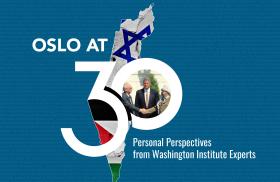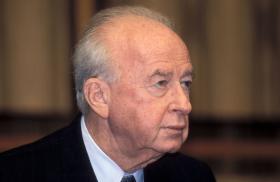
- Policy Analysis
- Fikra Forum
Beyond Oslo: Reflections on Peace, Promise, and Possibility

Part of a series: Oslo at 30
or see Part 1: Oslo at 30: Personal Perspectives from Washington Institute Scholars A Compendium
A personal journey through peace, politics, and the legacy of the Accords
As the tumultuous wave of change swept across Eastern Europe following the fall of the Berlin Wall, hope surged in various corners of the globe. This was the time when I was coming out of secondary school and felt excited about the prospects of democracy and freedom sweeping through post-Communist Eastern Europe and inevitably, or so I thought, across the world. Against this backdrop, we heard the news that Israelis and Palestinians had secretly met in Oslo to end one of the most divisive conflicts of our time. The news and the buzz that accompanied it seemed even further validation of the march of peace sweeping the planet. Little did we know that the rising threat of radicalism and extremism, which would soon hit the Western Balkans, would also mark the years ahead for Europe, the Middle East, and beyond.
To a student of international politics interested in the Middle East, Oslo I and Oslo II were years of elation. I became obsessed with studying conflicts, conflict resolution, and mediation, inspired that through negotiations—not wars—nations and peoples could sort out their differences. What I and many others from the outside failed to grasp was that the realities on the ground left some on both sides deeply disappointed with the Oslo process. As this disappointment spilled over into violence, over 400 Palestinians and 250 Israelis were killed in the five years after the signing of the Oslo Accords.
The assassination of Israeli PM Yitzhak Rabin in 1995 was a profound shock to the world as it laid bare the opposition to peace with Palestinians in vocal segments of Israeli society. It also highlighted the growing strength of national and religious identities and their impact on politics. In hindsight, if national uniqueness and religion were driving the wars across the remnants of former Yugoslavia, why would emotions have been any different elsewhere? Unlike in the Western Balkans however, where conflicts erupted after decades of a relatively high degree of peace and coexistence under communist oppression, the Oslo Process came after many long years of horrendous violence between Israelis and Palestinians that had peaked in the first intifada.
The Oslo Accords' interim nature appeared promising to outsiders like me because they charted a way forward. They allowed both sides the time and breathing space to address the most controversial questions—such as borders, refugees, the status of Jerusalem, and settlements—after trust had been built through a time-limited transition process. But as trust quickly evaporated, and violence and terror surged during the second intifada, the growing divide between Palestinians and Israelis limited the political space for leaders to pursue any form of confidence-building. Slowly, the peace process came to a standstill.
Little did I know then that some eighteen years later, I would find myself thrust in the middle of all this as I took on the job of the UN Special Coordinator for the Middle East Peace process. Nor did I have any inkling that in this role, I would have to state publicly that the Middle East Peace Process was no more. But as I arrived at Government House in Jerusalem to take up my position in 2014, I quickly came to the realization that despite their public statements of support and commitment towards the peace process, both Israelis and Palestinians preferred to speak to their constituency and friends rather than come back to the negotiating table.
Faced with this challenge, I went back to the basics. I worked to develop relationships with all stakeholders built on trust, even as I warned of the risks on the ground to peace and focused on alleviating the threat of war in Gaza. These priorities reflected how the prospect of Israeli-Palestinian peace had dwindled from the high hopes of the nineties to conflict management, preventive diplomacy, and the grinding work to avert the constant threat of further escalation and increased violence.
The reasons behind this change are complex and multifaceted—terror and incitement to violence, settlement expansion, and Hamas’ control of Gaza just to name a few. More broadly however, two factors stood out in my mind upon my arrival. On the one side, it was the loss of belief within Israel that peace could be achieved through handing over land—a principle that had been the basis of Israeli policy since the successful peace treaty with Egypt in 1978. In response to violence, that belief was being replaced by the new doctrine that peace could come only through strength. On the other hand, it was the utter disappointment within Palestinian society that the enshrining of its national aspirations for statehood in international law via UN Security Council resolutions and a push for full UN membership had failed to deliver statehood. In response to these frustrations, Israelis and Palestinians had charted political strategies in relation to each other that made the return to meaningful negotiations close to impossible at that point.
During my five years as UN Special Coordinator, I had hardly met an Israeli who did not believe that the Peace Process only resulted in more violence, rockets, or terror, just as there was hardly a Palestinian who didn't see it as always resulting in the loss of land, more settlements, and checkpoints. Within Israel, the belief in achieving peace through Palestinian statehood had waned, replaced by a narrative emphasizing security. The Palestinian side, meanwhile, was wary of losing more ground, both literally and metaphorically.
And yet in spite of its massive challenges, the 30-year journey post-Oslo Era is not without its achievements. The Palestinian National Authority governance structures established in the West Bank are a testament to the Accords' legacy. The subsequent reforms to these structures that began with PM Salam Fayadh strengthened service delivery and introduced reforms that were critical for bolstering the economy. Many of these developments have subsequently been stunted as the Palestinian political process has stagnated, but to say that "Oslo is dead" and call for dismantling established institutions would be both premature and detrimental to the future prospects of peace and stability. The solution isn't in unraveling what has been built during the past three decades but building upon what has already been achieved.
As the Middle East Peace Process survives in the talking points of Foreign Ministries around the world when they visit the region, its basic premise endures—that a two-state solution, achieved through negotiations, is the reasonable way forward. This premise, along with the shifting dynamics of geopolitics in the Middle East, may indicate some potential avenues for reviving or reinventing a peace process that may ultimately engage both peoples in a peaceful resolution to this conflict.
Though noble, the notion of a one-state solution, with a diverse populace coexisting harmoniously, is fraught with complexities. No critic of the two-state solution has come up with a convincing explanation of how a one-state resolution that grants full and equal rights to Jews and Palestinians would ensure that the legitimate national aspirations of both peoples will be met. Jews are unlikely to agree to live in a state where they are a minority, and neither would Palestinians agree to live in a state where they don't have equal rights. So, a foundational assumption of Oslo—the idea that there needs to be a separation between the two peoples, remains alive.
The second element—the evolving geopolitics of the Middle East and the rising role of middle powers—is being written as we speak. The Abraham Accords signaled the Arab world's evolving stance towards Israel. Outside of the political and economic messaging of the Accords, they contained a very subtle message to Jewish Israelis—the acknowledgement that "Arab and Jewish peoples" are not only descendants of a common ancestor but are committed to the spirit of coexistence. This subtle acceptance that the Jewish people are not foreigners to the Middle East, but a historic and ancestral part of its mosaic, was an important recognition that had not been present in other peace treaties.
The history of the Balkans, marred by wars over holy sites, religion, national myths, and historical claims, has taught me to read and understand the importance of such subtle messages in politics. They are key when dealing with competing national narratives, which we in Southeast Europe have more than enough of for generations to come. My part of the world has lived through peaceful and forceful population exchanges, two Balkan and two World Wars, and most recently the post-Yugoslav wars of the 1990s. Borders have been drawn, re-drawn, and re-drawn again in the search of ethnic clarity. But we have learnt the hard way that peace will never be just about shifting a border; it will always require the involvement of identity, history, faith, and the right to live in dignity.
Drawing from the initial spirit of the Oslo Accords, where Palestinians and Israelis proactively sought a peaceful path forward, there is a desperate need for new leadership today. If bolstered by international support, this leadership can refocus on mutual recognition and mutual respect to the right and aspirations of partners in peace. And part of the process to rebuild trust is for the world to openly recognize that Jews and Palestinians have the historical, religious, and national right to statehood in the Holy Land—the right to statehood of one does not negate the right of the other. Nevertheless, leadership must start at home, within the domestic political landscape of Israel and the Palestinian people.
Israel is a vibrant democracy; its political leaders should be able to develop a compelling narrative that brings the focus back to peace and acceptance rather than on preserving today’s dangerous status quo. A whole generation of young people in Israel has grown up after the signing of the Oslo Accords; it is time for them to be part of developing a new narrative. They can now travel freely to Dubai, Manama, and Rabat, plan their holidays in Egypt, or visit the sites of Jordan and expect warm welcomes all around. Their country is strong and has firm partners across the region and beyond.
The Palestinian people are as vibrant and resilient as they come. They must be free of occupation and benefit from a fully inclusive domestic political process. They need to be able to elect their leaders freely and debate openly the future of their national project. I have often said that the division between Gaza and the West Bank is like a cancer that eats away at the Palestinian national dream. As long as Hamas controls the lives of two million people in the Strip, as long as there are no elections that unify Gaza and the West Bank under one democratically elected and accountable leadership, the goal of a state will most certainly wither away.
Such efforts will not be easy; just as the wars of the nineties profoundly reshaped the political landscape of the Western Balkans, the waves of violence between Israelis and Palestinians have reshaped the political landscape of the Middle East. The younger generation of Palestinians—who have grown up in an environment dominated by walls, checkpoints, and the omnipresent Israeli military—harbor anger, resentment, and despair. On the other hand, the younger generation of Israelis have grown up in a world dominated by rocket attacks, suicide bombings, and a narrative that portrays the Palestinians as the eternal enemy. This generation has not grown up with the ideals of Oslo. All they know is the reality they live in now.
In fact, the very term ‘peace process’ conjures skepticism. There is a palpable fear that attempts at dialogue might exacerbate tensions. Yet the vision of the 1990s, although it might seem distant, serves as a reminder of the possible. In a world where the ground realities shift and national narratives diverge, the legacy of the Oslo Accords must not be forgotten. It is a testament to what visionary leadership and international support can achieve.
The international community has a role to play now as well, but it is not to draw lines on a map or cajole both sides into photo opportunities of conferences that do not breed results. It was not the collective will of the international community that brought Yasser Arafat, Yitzhak Rabin, and Shimon Peres together in Oslo. They did it on their own, away from the cameras and microphones. The international community should instead support Israelis and Palestinians by creating incentives for peace and protecting them from those who will seek to disrupt a negotiated resolution of the conflict. To this end, it is worth considering the partners who have leverage with both sides and can speak truth to power when need be. A new formula needs to be found, one that brings the United States, Europe, and key Arab countries working together for peace. Perhaps new Asian actors can also contribute to the process. The work itself, however, needs to start at home; it cannot be imposed from the outside.
In the end, the Oslo Accords succeeded in forging a path toward mutual recognition. However, the aftermath of the Accords emphasized that mutual recognition cannot exist in a vacuum. It must be nurtured and sustained through constant dialogue, understanding, and compromise. A series of missed opportunities, mistakes, and a lack of political will have marked the decades since Oslo. And as we stand at this juncture, it is essential to recall the original spirit of Oslo—one of hope, cooperation, and mutual respect.
I hold fast to a vision where leaders of both sides, driven by a deep conviction and responsibility towards their people, will chart a path toward peace. For peace to be sustainable, it cannot be based on constantly managing tensions but instead must address the fundamental root causes of the conflict. This involves recognizing the deeply held beliefs, the traumas, and the hopes of both peoples and working tirelessly to bridge the gap of mistrust. In this endeavor, international mediators have a pivotal role—not imposing solutions but facilitating dialogues that lead to mutual understanding and respect. It's a monumental task, but history shows that leaders who are genuinely committed to peace can overcome even the most insurmountable challenges.






